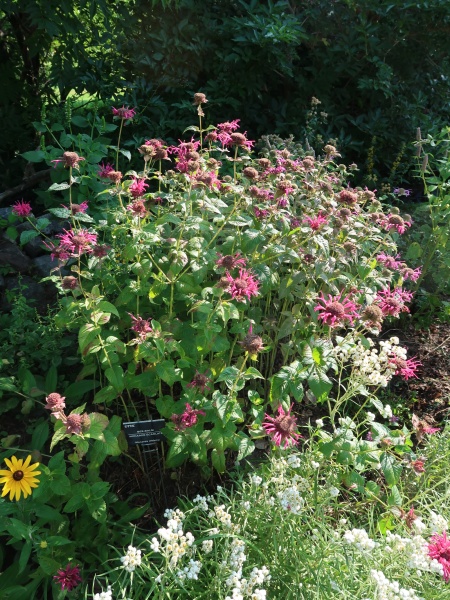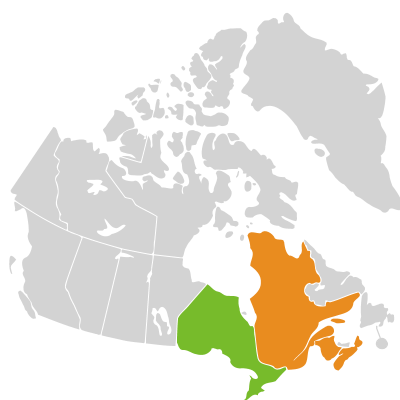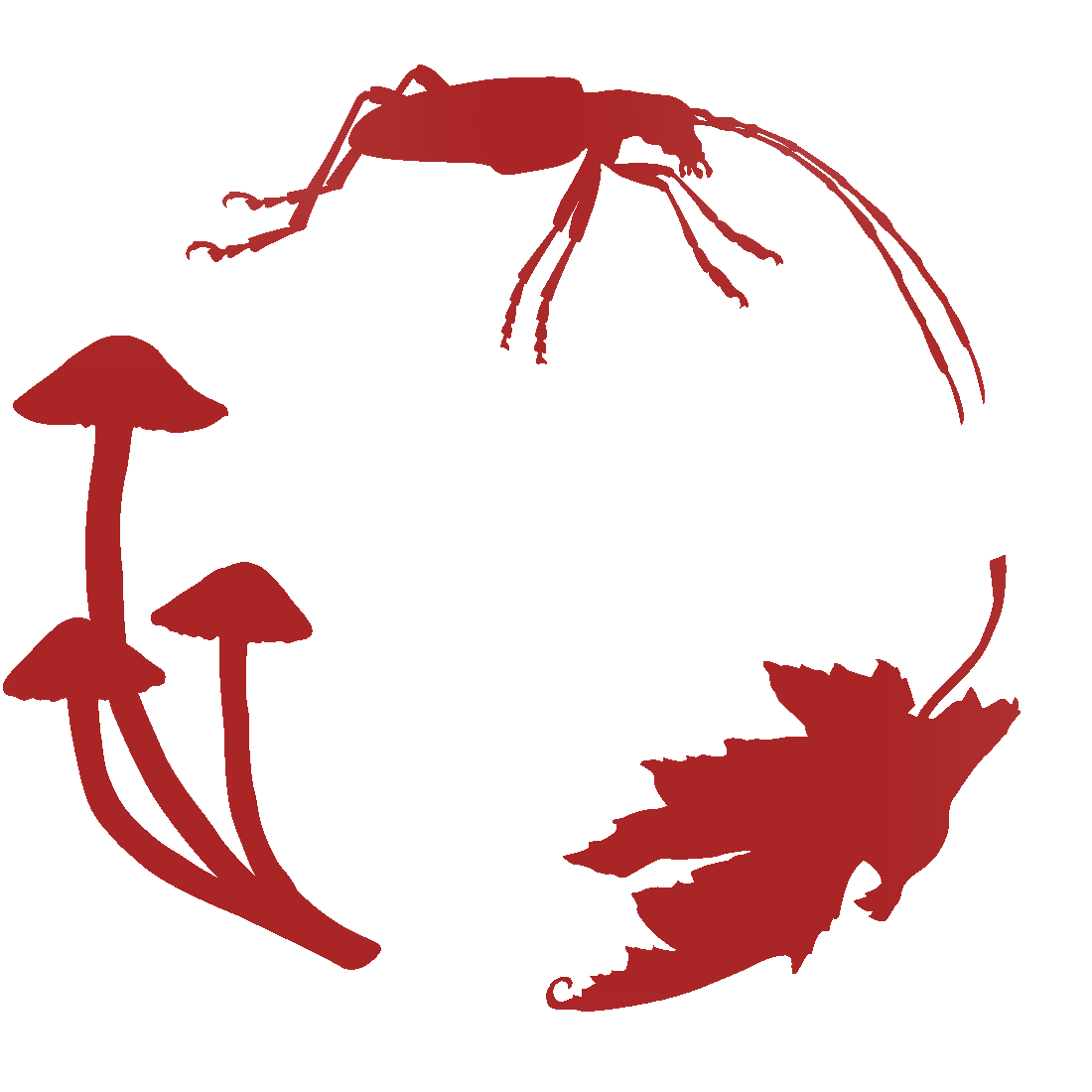
Source: OWSL
Monarda didyma
Scarlet Beebalm
Monarde écarlate
Synonyms
beebalm
bergamot
fragrant balm
mountain mint
Oswego tea
monarde pourpre
No seeds available for this plant.
We currently accept seeds for this plant
Bloom Colour: Red
Bloom Period: Jul - Aug
Max Height: 3.0 feet
Max Width: 2.0 feet (spreads by rhizome)
Light Condition:
 More than 6 hours of direct sun a day
More than 6 hours of direct sun a day
 More than 2 or 3 hours but less than 6 hours of direct sun a day
Soil conditions:
More than 2 or 3 hours but less than 6 hours of direct sun a day
Soil conditions:
 Tolerates medium soil condition
Tolerates medium soil condition
 More than 6 hours of direct sun a day
More than 6 hours of direct sun a day
 More than 2 or 3 hours but less than 6 hours of direct sun a day
More than 2 or 3 hours but less than 6 hours of direct sun a day
 Tolerates medium soil condition
Tolerates medium soil condition
Lifespan:
Perennial
plants that will that come back year after year
Gardener Experience:
 Suitable for beginner gardeners
Suitable for beginner gardeners
 Easy to germinate
Easy to germinate
 Self-seeding
Self-seeding
 Suitable for beginner gardeners
Suitable for beginner gardeners
 Easy to germinate
Easy to germinate
 Self-seeding
Self-seeding
Landscape Uses:
 Suitable for wetland garden
Suitable for wetland garden
 Suitable for shoreline rehabilitation
Suitable for shoreline rehabilitation
 Suitable for container garden
Suitable for container garden
 Suitable for school gardens
Suitable for school gardens
 Tolerates boulevard garden conditions
Tolerates boulevard garden conditions
 Suitable for wetland garden
Suitable for wetland garden
 Suitable for shoreline rehabilitation
Suitable for shoreline rehabilitation
 Suitable for container garden
Suitable for container garden
 Suitable for school gardens
Suitable for school gardens
 Tolerates boulevard garden conditions
Tolerates boulevard garden conditions
Ecological Benefits:
 Supports hummingbirds
Supports hummingbirds
 Supports birds
Supports birds
 Supports pollinators
Supports pollinators
 Butterfly host
Butterfly host
 Bee host
Bee host
 Supports hummingbirds
Supports hummingbirds
 Supports birds
Supports birds
 Supports pollinators
Supports pollinators
 Butterfly host
Butterfly host
 Bee host
Bee host
Tolerates:
 Deer resistant
Deer resistant
 Rabbit resistant
Rabbit resistant
 Tolerates limestone conditions
Tolerates limestone conditions
 Tolerates juglone conditions
Tolerates juglone conditions
 Tolerates transplantation
Tolerates transplantation
 Deer resistant
Deer resistant
 Rabbit resistant
Rabbit resistant
 Tolerates limestone conditions
Tolerates limestone conditions
 Tolerates juglone conditions
Tolerates juglone conditions
 Tolerates transplantation
Tolerates transplantation
Special Features and Considerations:
 This plant is endangered
This plant is endangered
 This plant is endangered
This plant is endangered
Plant Location
Distribution according to VASCAN

Ephemeral
Native
Introduced
Excluded
Extirpated
Doubtful
Absent
Thrives in Ecozones
- Mixed Wood Plains
Ecological Benefits
Butterflies Supported by Monarda didyma
- Pyrausta signatalis (Raspberry Pyrausta)
Specialized Bees Supported by Monarda didyma
- Dufourea monardae
Plants that grow in similar conditions, that bloom at the same time.
Complementary Plants
- Allium cernuum
Nodding Onion
Ail penché - Coreopsis lanceolata
Lance-leaved Coreopsis
Coréopsis lancéolé - Erigeron strigosus
Rough Fleabane
Vergerette rude - Linum lewisii
Lewis' Wild Blue Flax
Lin de Lewis - Verbena stricta
Hoary Vervain
Verveine veloutée
Substitute For Non-Native Plants
- Iris pseudacorus (Yellow Iris)
- Lobelia cardinalis (Red Cardinal Cultivar)
- Mentha (Non-Native Mints)
- Monarda (Beebalm Cultivars)
Sowing Information
Download Seed Envelope Labels (PDF)
- Sowing depth: Surface sow
- Sow anytime
- Stratification duration: 0 days
- Self-seeding
- Notes: Can be sown in spring in warm soil.
Harvesting and Seed Sharing
- Harvest start month: September
- Harvesting indicator:
- Pods are brown, seeds are dark, and crisp, and little stem connecting the pod to the main stem is brown (not green)
- Harvesting:
- Put pods in food processor or blender and blend seeds, and strain seeds using a strainer
- Seed viability test:
- No test needed before donating
- Packaging measure: Half of one, 1/32 teaspoon
- Seed storage:
- Air dry in paper bag or open container, for a few days until crisp
- Shake seeds to move them once in a while to prevent molding
- Cultivar: Yes, do not donate unless you know source, and there are no known cultivars in your garden or at proximity
- Remove non-seed material
- No harvesting video available at this time.
Toxicity Notes
Not known to be toxic to mammals if ingested.


 Canadensis
Canadensis
